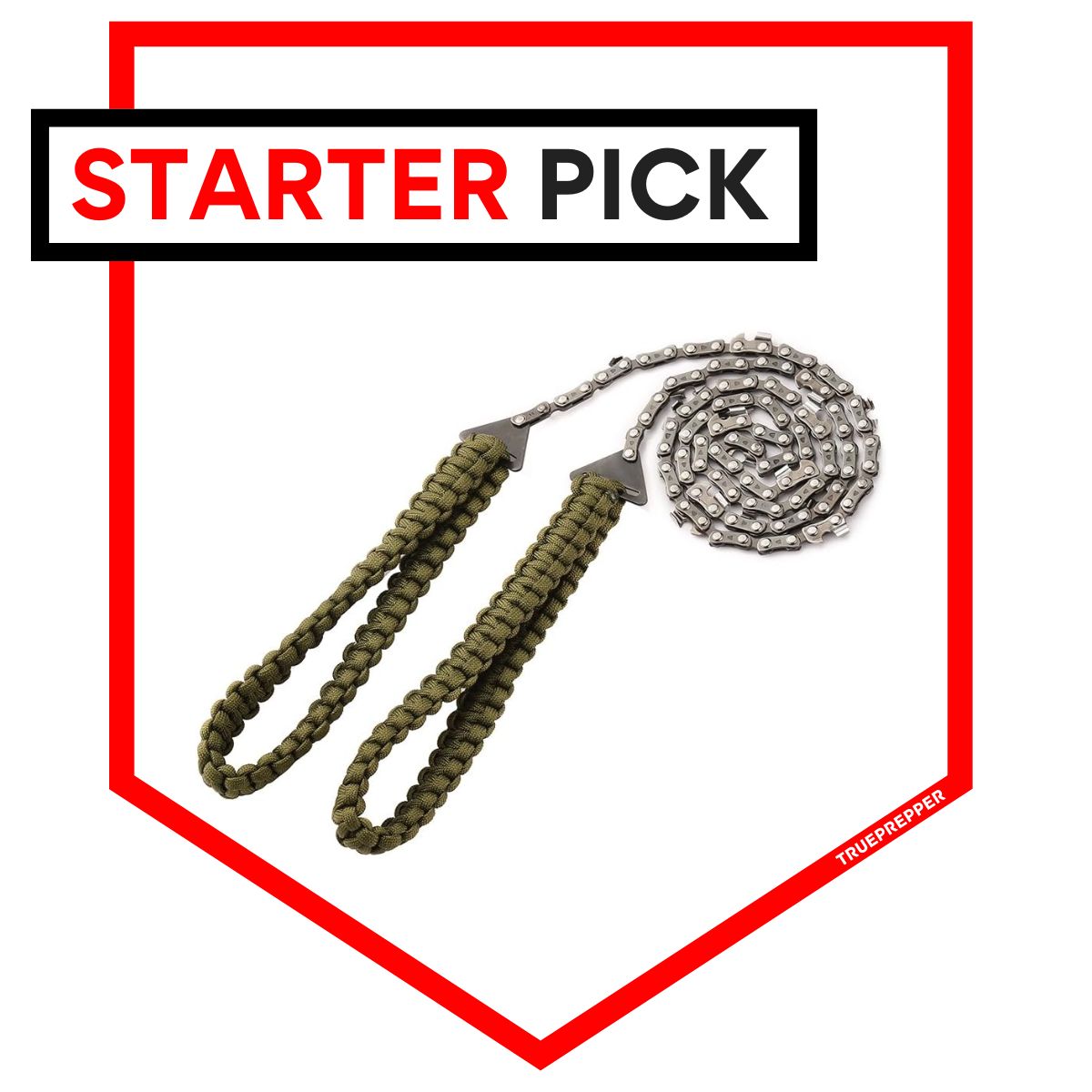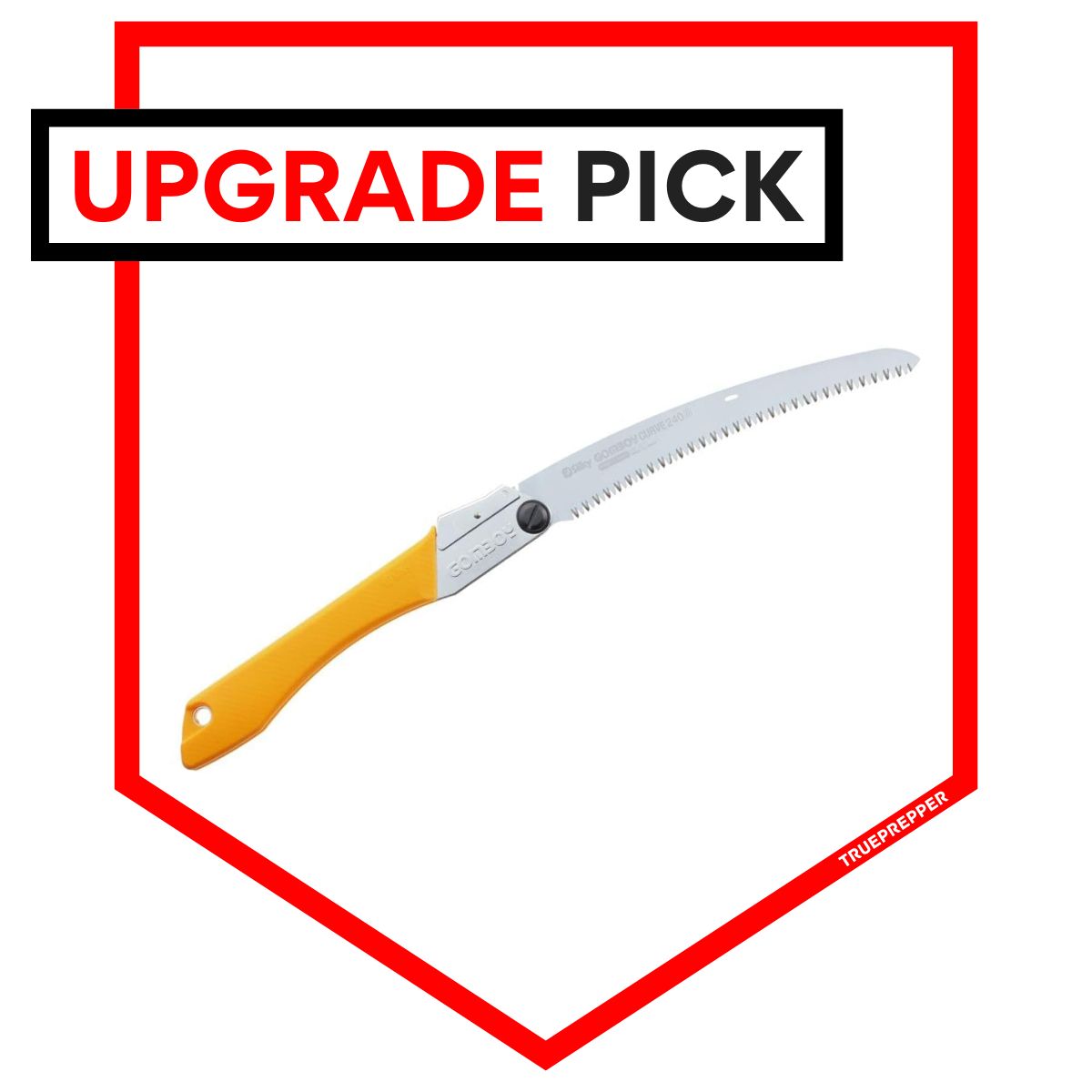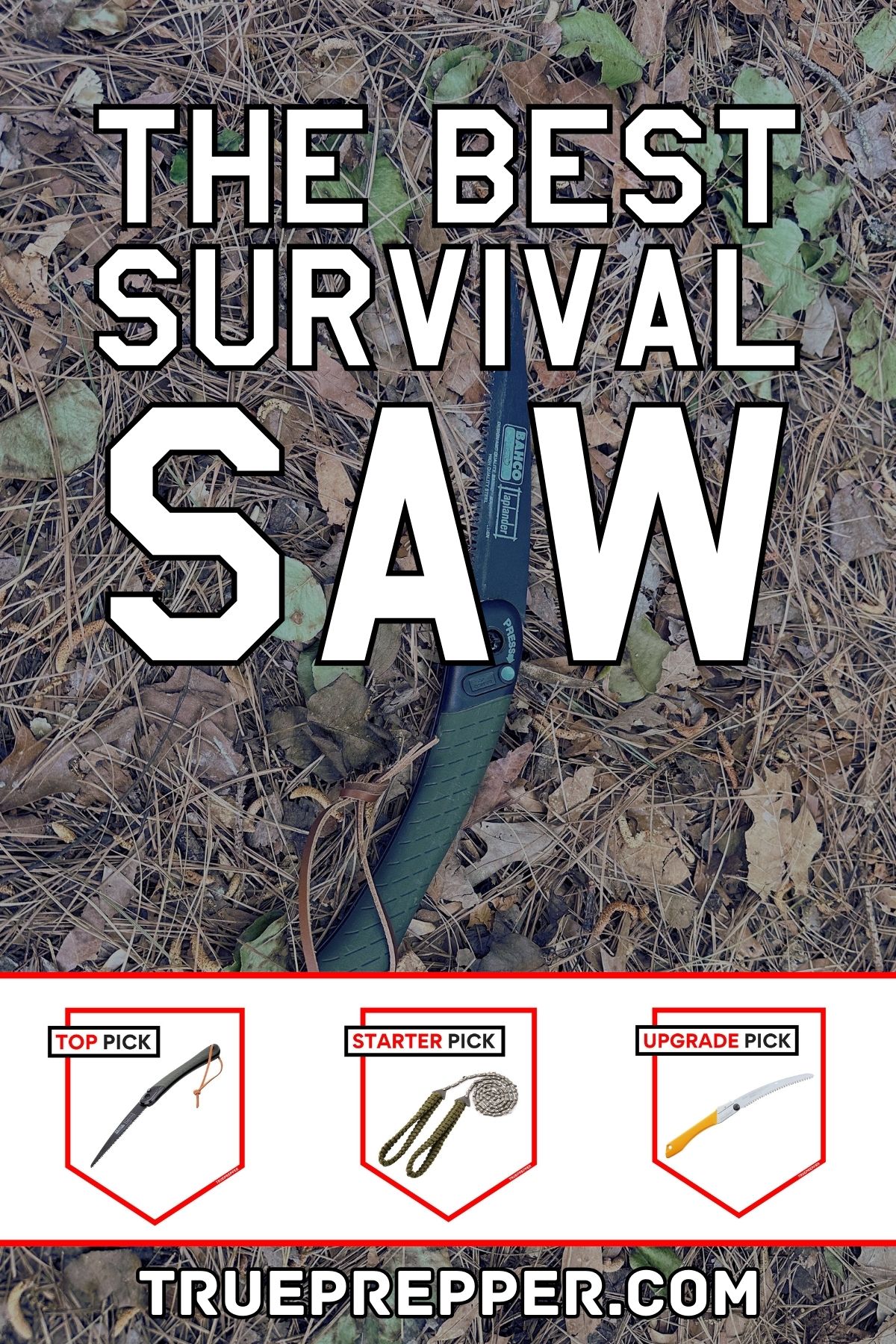Hatchet, knife, or saw? All three are important in survival kits, but the humble saw is often overlooked. A good saw will let you trim limbs to make a shelter or clear debris after a disaster. The best survival saw will let you do all of this with less energy and without worrying about the saw breaking. Aggressive teeth, rock-solid durability, and a lightweight small profile are all hallmarks of folding saws primed for survival.
There are several options to consider when it comes to survival saws: blade type, size, durability, etc. This is where we come in. We’ve researched the best survival saws, tested each of them, and now the results are in: the overall best, a budget option, and an upgrade option. If you need a saw that will let you create shelters in a survival situation, one of our picks will keep you covered.
Contents (Jump to a Section)
The Best Folding Survival Saw
Bahco Laplander
Tough, Small, and Lightweight
An aggressive blade that makes cuts easy combined with a lightweight body gives this saw the best marks for survival kits.
*Price at time of publishing; check for price changes or sales.
Most survivalists and preppers are familiar with the Laplander, and most survivalists and preppers agree that it is a solid choice. Bahco was founded by Johan Petter Johansson, and eventually, the Swedish company was picked up by Snap-On, who owns it now. It’s developed quite a quality reputation in the bushcraft community, similar to Morakniv, in that it cuts way above its class.
Here are the specs that set it apart:
- 7.5″ blade coated for rust prevention
- 16″ unfolded length
- 7.1 ounces
- Cuts on forward and back strokes
- 7 TPI (Teeth per inch)
- Button lock and leather retention cord
With solid performance and a price that doesn’t break the bank, it’s easy to see how Bahco Laplander Folding Saw is the best choice out of all of the competition.


Budget Survival Saw
Pocket Chainsaw
Small, Lightweight, and Versatile
With enough elbow grease and time, this pocket chainsaw can chew through almost anything.
*Price at time of publishing; check for price changes or sales.
Pocket chainsaws are useful for survival in that they are so versatile. You can use it to prune branches or topple trees, and it fits in a smaller pouch than a folding saw and is more lightweight. You can also toss it over a limb with some paracord attached to bring a large tree down in sections, pulling on the paracord at an angle to use the saw.
The downside is that it takes a little more setup and can be more difficult to use/maintain than a folding saw. Depending on your situation and the rest of your kit, those may be negligible drawbacks. Here are the specs:
- 36″ chain blade
- High-carbon steel
- 4.9 ounces
Pick up a Pocket Chainsaw to add a workhorse to your bug out bag.

Upgrade Folding Survival Saw
Silky GomBoy
Tough, High-Quality, and Silky-Smooth Cuts
If you are looking for the best quality then you have found it with the Silky that fits best for survival.
*Price at time of publishing; check for price changes or sales.
Silky is one of the big brands to beat when it comes to saws, pruning, etc. They are one of the professional favorites and they come in a wide range of sizes and blade types. The GomBoy is slightly bigger than our top pick and can give you butter-smooth cuts anywhere. Plus, it’s not much heavier. Here are the full specs:
- 9.5″ blade (240mm, Large Teeth model)
- 20″ unfolded length
- 8.0 ounces
- Cuts on forward and back strokes
- 6.5 TPI (Teeth per inch)
- Frame lock and clear carrying case
If you are looking for the best of the best, pick up a Silky GomBoy Curve Professional Folding Saw for your mobile survival kits.
Everything We Recommend

Pocket Chainsaw
With enough elbow grease and time, this pocket chainsaw can chew through almost anything.
Where to Buy
$19* at Amazon
*at time of reviewing

Silky GomBoy
If you are looking for the best quality then you have found it with the Silky that fits best for survival.
Where to Buy
$64* at Amazon
*at time of reviewing
The Survival Saws We Compared
Our research narrowed the field down to the several saws that we tested: Bahco, Silky, Sportsman, Coghlan’s, Corona, Fiskars, and more.
You can see our full list of review criteria below in the What to Look For section, with an explanation for each.
We focused on folding saws, collapsible saws, and hand chainsaws. We excluded pretty much every other type of saw: power saws, chainsaws, pruning saws, and non-folding hand saws. Those are all useful in certain situations- for example, chainsaws are extremely helpful in the aftermath of a hurricane. But they aren’t versatile enough for portable survival kits, which was our focus.
We’re always looking for new and better equipment, so if you have a survival saw that you swear by let us know in the comments. We review most of our tested gear annually, so we can always get it in the next roundup round and see if it makes the cut and we can see if it will beat out our top picks.
What to Look For
The best survival saws have several important features to look for:
- Value
- Blade & TPI
- Comfort
- Size & Weight
- Durability
When you get the right blend of these, you can find a reliable saw that will help you tackle any shelter plans. Below, we break down what each of these features means for the survival saws that set themselves apart.
Value: Cost vs. Benefit
The amount of money you spend on something like a folding saw shouldn’t blow out your entire budget. Don’t go overspending or overdo it. Budget according to your risk and your needs rather than just spending lavishly.
On the flip side, you don’t want to go too cheap or just plain get the wrong thing. If the end of the saw snaps off on the first use, it’s not going to do much good when you need to get a shelter up by dark.
You never want to spend too much money on one resource, especially something like saws. It’s better to diversify your preparedness gear to make sure you are covered for a wide range of scenarios. There is a sweet spot where you get high value with not too high of a price, which is where our top pick sits.
Blade & TPI
Blade steel material, shape, thickness, and teeth-per-inch (TPI) are all important factors to consider.
Folding saws meant for survival typically have curved blades, blade thickness large enough to prevent breaks under normal use, and an aggressive TPI for rough cuts. We’re not out here trying to make furniture with these saws, so fine teeth are out of the question.
Comfort
The comfort of the grip is important- if you end up doing a lot of cutting you’ll want at least a curved grip if you don’t have a contoured one. Being able to swap hands or use both hands is important as well to avoid fatigue on larger cuts.
Weight can also play a factor in comfort- heavier saws can give you more fatigue on longer jobs. Just like knives, a good handle/blade balance can help with fatigue as well.
Size & Weight
With survival saws being designed for portable kits, the carrying size and weight are an important consideration. When you are packing bug out bags and other mobile kits, ounces matter. It can be easy to overload yourself by packing gear without checking out the weight first. If you do this, you can easily end up with a bag you won’t be able to lug more than a few miles.

Durability
The materials used, blade thickness, and quality all impact durability. Despite using plastic handles to save weight, many survival saws are surprisingly durable.
Quality steel and brands that have proven themselves in adverse conditions were solid indicators in testing how durable different folding saws and hand chainsaws would be.
How to Use a Survival Saw?
In a survival situation, you may be using a saw to cut through pretty much anything- not just wood. Luckily, saws are pretty simple:
Folding Survival Saw Steps
- Identify your cut line and make sure there will not be binding (weight on the blade) or unpredictable drop.
- Make sure the saw is all the way open and locked (if there is one).
- Place the saw on the cut line and start to push/pull. Be sure not to apply too much pressure- let the saw work. Keep the blade moving to prevent binding and stalling.
- Stay clear of the drop and be wary of what is under your cut line.
- Once you are done using the saw, clean the blade and close it up to avoid accidents.
Pocket Chainsaw Steps
- Add rope/handles to the chainsaw if you plan on using it to prune up high.
- Identify your cut line and make sure there will not be binding (weight on the blade) or unpredictable drop.
- Place the saw on the cut line and start to pull, alternating hands. Be sure not to apply too much pressure- let the saw work and don’t force it to catch the teeth too deep. Keep the blade moving to prevent binding and stalling.
- Stay clear of the drop and be wary of what is under your cut line.
- Once you are done using the saw, clean the blade and put it away to avoid accidents.
Simon demonstrates some of our folding saw picks and a pocket chainsaw (and several other saw types) in this video:
Who Needs a Survival Saw?
Survival saws are not completely necessary in several kits, but it sure does help to have one around when you need it.
We suggest folding saws for your mobile kits:
Powered chainsaws and non-folding hand saws are preferred, but you could opt for a folder in your:
Saws are a consumable item, even if you have the tools to sharpen them. So, it never hurts to have more than one.
How We Review Products: We research thoroughly before selecting the best products to review. We have vast prepping and survival experience and bring in outside experts when needed. Hours on end are spent testing gear in stressful conditions and using specialized testing gear to verify claims. We assign performance criteria and impartially rate each tested item. Learn more about how we test.
Sources and References
All of our experience and the testing we do to determine the best survival saw is useless without listing our research sources and references. We leaned on these for the book knowledge that we paired with our hands-on testing and practical military and prepping experience:
Bleed, A., et al. (1982). A Performance Comparison of Japanese and American Hand Saws. Proceedings of the Human Factors Society Annual Meeting. Volume 26. Issue 5. (Source)
Kroemer, E. (1974). Horizontal Push and Pull Forces. Applied Ergonomics. Volume 5. Issue 2. Pages 94 -102. (Source)
Naylor, A. (2014). Evaluating the Cutting Mechanics of Woodworking Hand-Saw Teeth. International Journal of Materials, Mechanics and Manufacturing, Volume 2. Issue 2. (Source)
The Final Word
Being able to make a shelter on the fly is a great skill for self-sufficient survival, and if you have some trees around a good saw can help you get there.
Here are a few related articles our readers have also found helpful:
We presented quite a lot of information, but as always: if you have any questions let us know and we would be happy to help. Our research and testing found the Bahco Laplander to be the best option given its value, cut, comfort, profile, and durability.
If you pick up one of our suggested folding saws- make sure you are familiar with it and know how to use it. Get it out in the yard or woods and try it out. You don’t want to encounter a survival situation fumbling with new gear.
Keep exploring, stay prepared, and be safe.
Prepare Your Way With Us
No judgement and no imperatives. Prepare the way you want to with the trusted source millions of modern preppers have relied on.
Our newsletter fires out every Monday where you can expect:
- Practical prepping guides and tips
- Thorough survival gear reviews
- Noticeably absent spam and popups
- < 0.4% of people unsubscribe

Read the full article here
